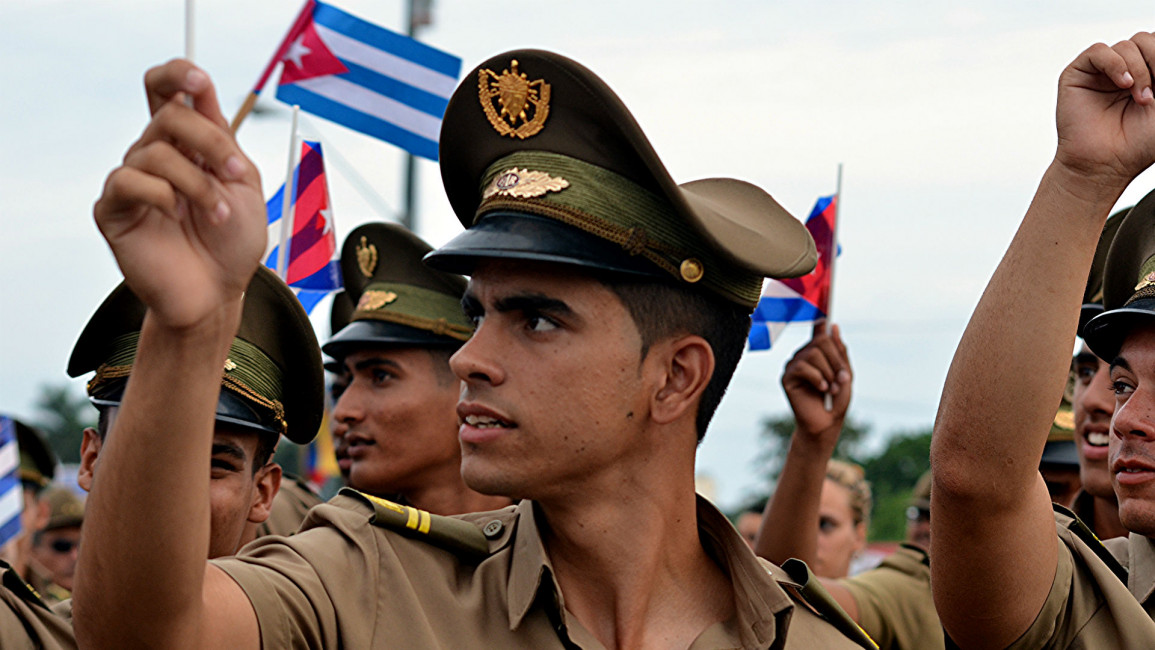World leaders hail 'historic' US-Cuba rapprochement
World leaders welcomed the announcement that the United States and Cuba are moving to restore diplomatic relations and remove one of the last vestiges of the Cold War after more than 50 years of hostility.
From China to Chile, plaudits rang out. South American leaders holding a trade meeting in Argentina interrupted their session and broke into euphoric applause.
The gush of praise for the shock announcement in Washington and Havana - it emerged that secret talks have been underway for a year and a half - featured a plethora of terms like "turning point" and "historic day."
'Time to turn page'
In making the announcement, President Barack Obama said decades of trying to isolate Cuba had failed, and it was time to turn the page. The US embassy in Havana has been shuttered since 1961, two years after rebels led by Fidel Castro ousted President Fulgencio Batista.
"We will end an outdated approach that for decades has failed to advance our interests and instead we will begin to normalize relations between our two countries," Obama said. He said he would urge Congress to lift the trade embargo, imposed in 1960, while using his presidential authority to advance diplomatic and travel links.
"We are all Americans," Obama declared, breaking into Spanish.
The White House portrayed the US move as a bid to reassert US leadership in the Western Hemisphere. Later, Obama even raised the possibility, something utterly unthinkable until now, of his visiting the island not far from the coast of Florida.
Missile Crisis
Cuba was ground zero of the Cuban missile crisis of 1962 that brought a nervous world to the verge of nuclear war between the United States and the Soviet Union.
The European Union, which is also moving to normalize ties with Cuba, hailed the breakthrough as a "historical turning point."
"Today another Wall has started to fall," said EU foreign affairs head Federica Mogherini.
In Havana, residents gathered around television sets in homes, schools and businesses to hear the historic national broadcast, which coincided with a statement by U.S. President Barack Obama in Washington. Uniformed schoolchildren burst into applause at the news.
At the University of San Geronimo in the capital's historic center, the announcement drew ringing from the bell tower.
Throughout the capital, there was a sense of euphoria as word spread.
"For the Cuban people, I think this is like a shot of oxygen, a wish-come-true, because with this, we have overcome our differences," said Carlos Gonzalez, a 32-year-old IT specialist. "It is an advance that will open the road to a better future for the two countries."
Fidel and Raul Castro led the 1959 rebellion that toppled the dictatorship of Fulgencio Batista. The U.S. initially recognized the new government but broke relations in 1961 after Cuba nationalised US owned businesses.
As Cuba turned toward the Soviet Union, the U.S. imposed a trade embargo in 1962.
And particularly since the collapse of the USSR in 1991, Cubans have confronted severe shortages of oil, food and consumer goods, forcing them to ration everything from beans to powdered milk.
The Cuban government blames most of its economic travails on the embargo, while Washington has traditionally blamed Cuba's economic policies.
| Americans react to the news of US-Cuba agreement [Source: AFP] |
Vatican diplomacy
Obama and President Raul Castro praised the help given by Pope Francis, the first Latin American pontiff, and the Catholic Church in brokering better relations between the long-time enemies. In response, the Vatican said the pope warmly congratulated both governments for overcoming "the difficulties which have marked their recent history."
Canada was also praised for hosting secret talks between the sides.
An outdated policy
The breakthrough came after Havana released jailed US contractor Alan Gross and a Cuban who spied for Washington and had been held for 20 years, one of the most important US agents in Cuba.
Havana also agreed to release dozens of political prisoners, a senior US official said.
The United States in turn freed three Cuban spies, and Obama said he had instructed the US State Department to re-examine its designation of Cuba as a state sponsor of terrorism.
The stand-off after the trade embargo began was marked by incidents that threatened to send the Cold War to boiling point.
CIA-backed Cuban exiles suffered a bloody defeat in the Bay of Pigs invasion and during the missile crisis US warships blockaded the island.
The embargo hurt the Caribbean island state's economy, but it failed to unseat the communist government led by the Castro brothers.
Obama now has only two years left in office, Fidel Castro is 88 and ailing and his brother Raul is 83. With their window for action closing, both sides were under pressure to make a gesture.
Rightwing Ire
US Republican lawmakers quickly denounced the deal, in a foretaste of the resistance that Obama will face as he tries to persuade Congress to back a full end to the embargo.
House leader John Boehner called the deal "another in a long line of mindless concessions to a dictatorship that brutalizes its people and schemes with our enemies."
The 65-year-old Gross, who had been held for five years for spying, was welcomed back onto US soil at an airbase outside Washington by Secretary of State John Kerry.
Also returning was the unnamed intelligence agent who had been caught working for the US in Cuba and held for two decades. Obama called the Cuban one of the United States' most important agents on the island.
In exchange for this prisoner, the United States released the three Cuban agents, who were welcomed by Raul Castro at Havana's airport as they returned to Cuba.
Gross was arrested in 2009 for distributing communications equipment to members of Cuba's Jewish community while working as a contractor for the US Agency for International Development.



